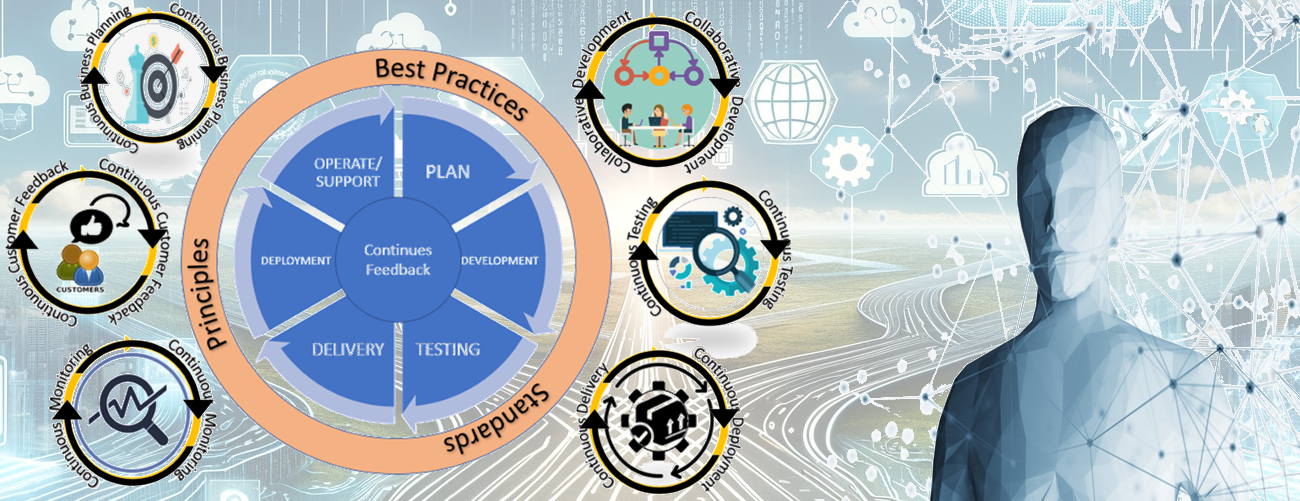While wearing my Tech Program Manager with a keen interest in the evolving landscape of DevOps, I've had a front-row seat to the seismic shifts that are redefining our industry. Let's take a stroll through the current trends that I believe are not just fleeting fads but pivotal movements shaping the future of how we build and deliver software.
Infrastructure as Code (IaC)
From the trenches, I can tell you that the allure of IaC is undeniable. We're scripting our way out of the manual setup quagmire, and for good reason. The ability to spin up an entire infrastructure from a few lines of code is not just cool; it's a game-changer. It's about speed, yes, but also about the consistency and repeatability that come from eliminating the "it works on my machine" syndrome. The market's trajectory towards IaC is clear, with more of my peers adopting tools like Terraform and CloudFormation to keep their infrastructure as nimble as their code.
Shift-Left Security
Gone are the days when security was an afterthought, tacked on at the end of the development cycle like a cumbersome after-market add-on. We're baking security into our CI/CD pipelines, and it's making a world of difference. By tackling security concerns early, we're not only mitigating risks but also saving the headache (and cost) of reworking code down the line. It's a proactive stance that's becoming a staple in DevOps methodologies, and frankly, it's about time.
AI and Machine Learning in DevOps
AI and ML are not just buzzwords; they're rapidly becoming our co-pilots in the DevOps journey. We're using AI to sift through the noise of our system data to predict and preempt issues before they become full-blown fires. And ML? It's helping us fine-tune our operations, learning from past incidents to optimize our responses. The promise of AI and ML in DevOps is huge, and we're just scratching the surface.
Serverless and Function-as-a-Service (FaaS)
Serverless is reshaping the way we think about infrastructure. It's liberating, really. We're moving away from the nitty-gritty of server provisioning to a world where we can focus on what matters most: the code. With serverless architectures, we're seeing not just operational efficiencies but also a cost model that makes sense for businesses. It's a win-win, and its adoption curve is testament to its value.
Microservices and Container Orchestration
Microservices are the building blocks of modern software architecture, and containers are their vessels. Kubernetes has become almost synonymous with container orchestration, and for good reason. It's like having a seasoned conductor leading an orchestra of services, ensuring each plays its part at the right moment. This trend is about agility and resilience, and it's transforming the way we deploy and manage applications at scale.
GitOps
GitOps is like the GPS for our deployment journeys. It's providing us with a clear path from development to deployment, with version control as our guide. The idea of using Git pull requests for infrastructure changes is as elegant as it is practical. It's a workflow that speaks the language of DevOps, marrying the rigor of version control with the dynamism of a fully automated pipeline.
Validating the Vision
But don't just take my word for it. The proof is in the pudding—or in this case, the code and the culture. Market research from giants like Gartner and Forrester offers hard numbers that back up these trends. And in my own experience, the benefits are tangible. Whether it's the speed of deployment, the robustness of our security posture, or the sheer efficiency gains, the evidence is clear and compelling.
In our line of work, staying still is akin to moving backward. As software engineers and architects, we're not just observers of these trends; we're active participants, shaping them with each line of code we write and each system we architect. The future of DevOps is bright, and it's a future we're building together—one commit at a time
References
-
Forrester's "DevOps 2030: People, Practices, And Platforms" This resource discusses predictions and the future state of DevOps, exploring how it may look by the year 2030. It delves into the current trends and anticipated evolution of DevOps practices, which is essential for understanding the long-term trajectory of DevOps in the industry.
-
Forrester's "The Future Of DevOps" Forrester examines the continuous evolution of DevOps, highlighting its growing importance across different platforms and practices. This resource is valuable for digital and IT leaders who aim to keep abreast of how DevOps remains a critical component of the technological landscape.
-
Gartner's "Hype Cycle for Agile and DevOps, 2023" Published in July 2023, this document offers insights into how agile and DevOps practices are being improved by leading software engineering teams. It includes comprehensive research analysis and recommended readings, which can guide software engineering leaders to better understand the innovations in the field.
-
Gartner's "The Secret to DevOps Success" Gartner provides an analysis that highlights the challenges faced by DevOps initiatives, with a prediction that a significant percentage of these initiatives may fail due to organizational learning and change issues. This underscores the importance of focusing on people-related factors rather than just technology.


